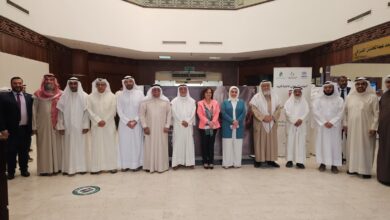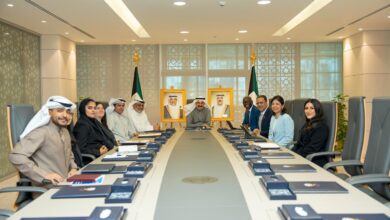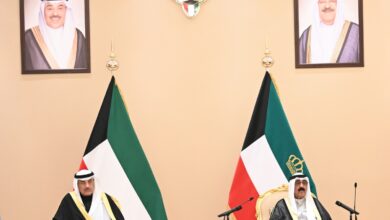
-
Growth forecasts for GCC countries have been revised down to 2.2% from the previous estimate of 2.7% three months ago.
-
Saudi Arabia, which is implementing maximum production cuts, will witness a 5% contraction in oil activities this year, down from the expected growth of 0.7% three months ago.
-
With the exception of housing rents in some countries, especially Saudi Arabia, inflationary pressures remain under control, with rates reaching less than 2% in all GCC countries, except for Kuwait and the UAE.
The latest economic developments report for the Middle East, prepared by Oxford Economics and commissioned by the Institute of Chartered Accountants in England and Wales (ICAEW) anticipates a gradual recovery in 2024 due to ongoing restrictions on oil production.
Growth forecasts for Gulf Cooperation Council (GCC) countries have been revised down to 2.2% from the previous estimate of 2.7% three months ago. However, non-energy sectors, including those in Bahrain and Qatar, are expected to maintain their resilience, as reported by Al Anba newspaper.
As the OPEC+ group continues voluntary reductions in oil production during the third quarter of this year, the pace of recovery in the energy sectors of Gulf Cooperation Council countries will be delayed.
Oil production in the GCC countries is now expected to contract by 2.6% this year, instead of the previously expected expansion of 1.3% three months ago.
Saudi Arabia, which is implementing maximum production cuts, will witness a 5% contraction in oil activities this year, down from the expected growth of 0.7% three months ago. However, as voluntary production cuts are eased in 2025, energy sectors will begin to contribute positively to GCC growth.
Qatar’s gross domestic product (GDP) growth forecast for this year is 2.2%, with expectations of rising to 2.9% by 2025. In contrast, Bahrain’s GDP growth is projected at 3.1% for this year but is expected to slow to 1.4% by 2025.
Since Qatar is not participating in OPEC+ production quotas, the gas sector remains a priority, with authorities intensifying efforts in the North Field gas expansion project, promising a positive medium-term impact.
Meanwhile, Bahrain continues to diversify its economy and reduce reliance on oil revenues as non-oil growth increased by 3.4% last year, accounting for approximately 84% of GDP.
On the other hand, the data paints a positive outlook for non-energy sectors across the GCC. In Saudi Arabia, investments are expected to flow into key sectors supporting mega projects, including construction, manufacturing, and transportation. There will be strong momentum in the sports and entertainment sector as transformation continues across the Kingdom.
The hospitality sector is likely to follow suit, with tourism remaining a key component of Saudi growth. Tourism also plays a strategic role in other countries, remaining a major driver of growth.
Tourism activity has rebounded strongly, with record numbers of visitors recorded across the GCC in 2023, continuing into this year.
In this regard, Hanadi Khalifa, the ICAEW Middle East Office Director, says, “While geopolitical risks present pressures and challenges for the GCC countries and the wider Middle East, we are optimistic about the continued commitment to diversification and sustainability goals. For example, Qatar became the first sovereign state in the Gulf Cooperation Council to issue green bonds despite not having clear zero emissions targets. Bahrain is also working to align its non-oil economic growth with its Economic Vision 2030 and COP28 commitments to reduce carbon emissions by 30% by 2035.”
On the other hand, Scott Livermore, economic advisor to the Institute of Chartered Accountants (ICAEW) and chief economist and general manager at Oxford Economics Middle East, said that although the region is facing mounting pressures amid the slowdown in global economies, the GCC countries remain relatively positive due to bilateral deals and strong investments.
Qatar recently signed a 20-year contract with India to supply 7.5 million tons of liquefied natural gas annually and a 27-year contract with Taiwan to supply 4 million tons.
Bahrain has also witnessed significant investment growth following the launch of the Golden License initiative in April 2023, which requires a minimum investment of $50 million and the creation of at least 500 job opportunities.
The financial services sector in Bahrain contributed about 18% to the gross domestic product, exceeding the oil sector, which contributed 16%.
GCC inflation expectations for 2024 have been lowered by 0.3 percentage points to 2.2% this year, with a further slowdown expected to 2.1% next year.
With the exception of housing rents in some countries, especially Saudi Arabia, inflationary pressures remain under control, with rates reaching less than 2% in all Gulf Cooperation Council countries, except for Kuwait and the UAE.
Due to exchange rates being linked to the US dollar, central banks in the Gulf Cooperation Council countries tend to follow interest rates set by the US Federal Reserve. The Federal Reserve is expected to gradually lower interest rates starting in September, with a total reduction of 150 basis points anticipated by the end of 2025.













